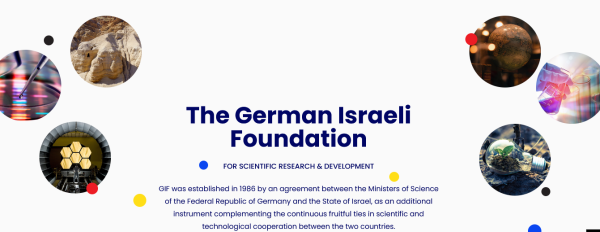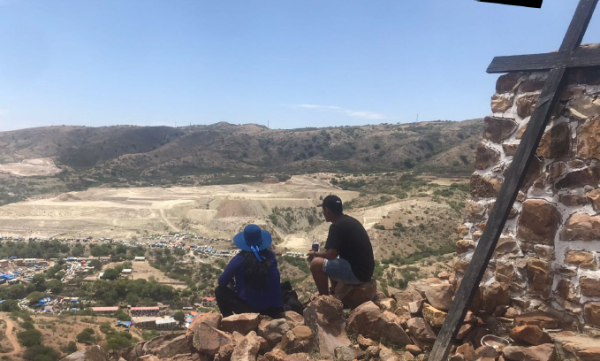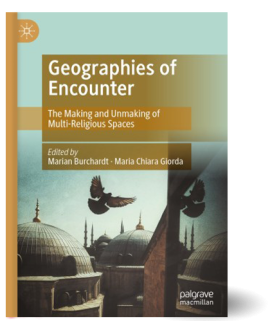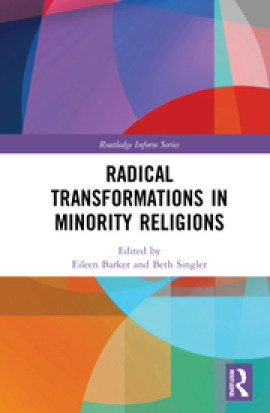|
If the newsletter does not display properly, please click here. |

|
|||||
|
|||||
|
Dear friends and colleagues, This time, we would like to announce our colloquium next Wednesday with our Senior Research Fellow Tom White. We also have a new publication for you by one of our KFG members. Besides that, we would like to draw your attention to several calls. We also have a recommendation for an online book launch for you and, last but not least, there are some news regarding upcoming maintenance work at our office building. Enjoy and have a good week! Anja & Lucy |
|||||

|
|||||
Next Week’s Colloquium: Tom White on “Pacific secularities: Religion, race and Fiji’s secular state”, 16 FebruaryNext Wednesday our Senior Research Fellow Tom White will give a presentation on his research project “Pacific secularities: Religion, race and Fiji’s secular state”. You find the relevant readings in our Member Area as well as information on the zoom connection data as the colloquium will take place as an online event. 16 January | 9.15–11.45 a.m. (CET) Online via zoom |
|||||

|
|||||
Maintenance Work on Air Conditioning Units in the KFG-Offices at Strohsack, 14–18 FebruaryNext week, between 14 and 18 February, there will be some maintenance work on the air conditioning units in our office building. For this, the maintenance company will have access to our rooms for a certain period of time. We would like to point out – without wanting to imply anything – that it might be better not to leave any valuables lying around in the open during this time. There is a lockable cabinet in each office that you can use. If you don't come to the office during this period and still have valuables lying around that you would like to be put away, please let us know (multiple-secularities@uni-leipzig.de) so that we can then lock them up. |
|||||
|
|||||
|
|||||

|
|||||
Call for Papers: International congress of the European Society for Intercultural Theology and Interreligious Studies, “Sacred Protest – Religion, Power, and Resistance in an Era of Upheaval” , 23–26 MarchReligion and protest converge and diverge and in pursuit of various ends, making careful analysis of religion and protest, as a prototypical manifestation of transcultural pressures, necessary. This bi-annual international congress of the European Society for Intercultural Theology and Interreligious Studies addresses central questions such as: Which religious actors protest, when, why and how? Which traditional resources are called upon in the service of or resistance to protest? Where do conditions for inter- and trans-religious cooperation or horizontal solidarity appear and why? And how are protest and religion to be studied, with which methods, and at what level of involvement? What are the values, emotions and possibilities for renewal in religiously motivated or censored protest? Submission of paper proposal: 20 February Conference date: 23–26 March | University of Bonn
|
|||||

|
|||||
Call for Proposals to GIF Young Scientists' Meeting: “Sovereignty, Entitlement, and Belonging: Jewish Legal Responses to Transition and Crisis in the 20th Century”, 30 May–2 JuneThis workshop, organised by the German-Israeli Foundation (GIF), invites experienced PhD students and postdocs up to 5 years after obtaining their PhD affiliated with German or Israeli academic institutions in the humanities, social sciences, or law to explore questions relating to different (mostly Jewish) legal responses to transition and crisis in the age of extremes, as well as larger topics about the nature of the nation state in relation to minorities in the course of the 20th century. Participants will be able to discuss their projects with a group of senior and advanced scholars. In addition, keynote lectures will be given by senior investigators. Participants will be expected to give a presentation of about 20 minutes. Young scientists interested in participating in the meeting are asked to complete a registration form, including a short description of the proposed presentation (up to 500 words) and a CV by 28 February. For questions, please contact Mina Horesh or Stephanie Weberring. Deadline: 28 February Date: 30 May–2 June Venue: Yearim Hotel, Kibbutz Ma’ale Hahamisha, Israel
|
|||||

|
|||||
Call for Participants: International Conference on “The Good Life – Transcultural and interdisciplinary dialogues”, 13–16 JuneMost likely one of the oldest queries of humanity is the question “What constitutes a good life?” Only in recent years, academia has begun to discuss the topic extensively along different disciplines and in different parts of the world and elaborated theories and even government projects inspired by ideas of the good life. The Sumak Kawsay or Suma Qamaña (“living a good life” in Quechua respectively Aymara language) of indigenous peoples from the Andes and the Resonance Theory (also called "a sociology of the good life") by Hartmut Rosa are the two currents discussing the good life that at this day enjoy most academic attention worldwide. The conference “The Good Life – Transcultural and interdisciplinary dialogues”, organized by the Max Weber Centre for Advanced Cultural and Social Studies at the University of Erfurt in cooperation with the Centre PROEIB Andes at the University Mayor of San Simón in Cochabamba in Bolivia, aims to initiate a dialogue between these two approaches with the purpose of enriching both and the work of those who use them separately. Therefore, it welcomes researchers from all academic disciplines to submit abstracts on a possible contribution of theirs related in some way to the question of the good life. Examples of areas of interest include Good life philosophies, Self world relations, Indigenous ontologies and/or epistemologies or Anthropology and ethnographies of religion and cosmovision. Deadline: 15 March Date: 13–16 June Online (with English and Spanish as conference languages)
|
|||||
|
If you have any content that you think suits the purpose of the weekly, please feel free to send it to us at multiple-secularities@uni-leipzig.de. |
|||||
|
Kolleg-Forschungsgruppe "Multiple Secularities - Beyond the West, Beyond Modernities" Nikolaistraße 8-10, 04109 Leipzig Mail: multiple-secularities@uni-leipzig.de |

